Bitcoin Exodus: A Deep Dive into the Decline of BTC on Crypto Exchanges

The cryptocurrency landscape is witnessing a seismic shift as the amount of Bitcoin held in known crypto exchange wallets reaches a six-year low, standing at a mere 2.34 million BTC. This substantial decrease in exchange-held Bitcoin raises intriguing questions about the motivations behind investors moving their assets off exchanges and points towards a compelling trend – a potential migration towards long-term holding strategies.
The Exodus Unveiled: The recent data on Bitcoin holdings in crypto exchange wallets reveals a striking departure from the norm. Over the past six years, the amount of Bitcoin stored on exchanges has steadily declined, marking a shift in investor behavior. What factors could be driving this exodus, and what implications does it hold for the broader cryptocurrency market?
Security and Self-Custody: One plausible explanation for the decreasing Bitcoin reserves on exchanges is the growing emphasis on security and self-custody. With the increasing awareness of cybersecurity threats and the risks associated with leaving assets on centralized platforms, investors may be opting for more secure methods of storage, such as hardware wallets or cold storage solutions.
Long-Term Holding Trend: The decline in exchange-held Bitcoin may signal a broader trend towards long-term holding strategies. Investors might be viewing Bitcoin not just as a speculative asset but as a store of value with the potential for long-term appreciation. This shift aligns with the narrative of Bitcoin evolving into digital gold, where holders are less inclined to engage in frequent trading.
Reducing Counterparty Risk: By moving Bitcoin off exchanges, investors aim to reduce counterparty risk associated with centralized platforms. The history of exchange hacks and insolvencies has instilled a sense of caution within the crypto community, prompting a move towards decentralized and self-sovereign control over assets.
Maturation of the Cryptocurrency Market: The decreasing reliance on exchanges may indicate the maturation of the cryptocurrency market. As the industry evolves, investors are becoming more discerning and are actively seeking ways to secure their assets independently. This shift reflects a growing sense of responsibility and sophistication within the cryptocurrency investor community.
The Implications: The diminishing Bitcoin reserves on exchanges have profound implications for both investors and the broader cryptocurrency market. As more investors adopt self-custody solutions and embrace long-term holding strategies, the dynamics of price discovery and liquidity could experience significant shifts. Additionally, the reduced presence of Bitcoin on exchanges challenges the conventional metrics used to assess market sentiment and potential sell-offs.
READ MORE Bitcoin ETFs Soar: Wall Street’s Unprecedented Embrace Sparks Cryptocurrency Revolution
Conclusion: The decline in the amount of Bitcoin held on crypto exchanges is a compelling phenomenon that demands attention and analysis. Whether fueled by security concerns, a shift towards long-term holding, or a desire to reduce counterparty risk, this trend underscores the evolving nature of the cryptocurrency market. As investors take greater control of their assets, the industry may witness transformative changes in trading patterns, liquidity dynamics, and the overall perception of Bitcoin as a valuable and resilient
Important Notice: Disclaimer Regarding Financial Advice
The information presented in this article is intended solely for informational purposes and should not be considered as financial advice. Coinshiba.online disclaims any responsibility for investment decisions made by individuals relying on the information provided herein. It is highly recommended to consult with a qualified professional or financial advisor before making any investment decisions. Your financial well-being is crucial, and seeking expert guidance ensures that your investment choices align with your individual financial goals and risk tolerance.




